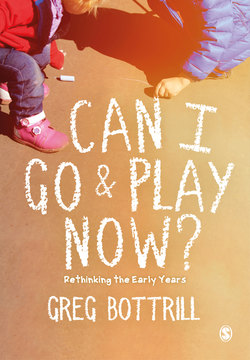Читать книгу Can I Go and Play Now? - Greg Bottrill - Страница 9
На сайте Литреса книга снята с продажи.
Chapter 1 The Child at the Centre of the Universe
Оглавление‘A broken heart is a brilliant start ... ’ – The Mary Onettes
The world of education is an amazing and rewarding world to be in, but there is a sense among many that work within it that there is something not quite right, that all is not well. Every teacher and educator has a concept of what education is and what it isn’t. Many would want to change education, many have tried, few have succeeded. Education policy is something that seems to be inflicted on teachers in the twenty-first century – it doesn’t feel collaborative and it often feels that no one is listening to common sense.
When I told my father that I was going to train to be a primary teacher, his first words, as someone who had spent his entire life as a teacher and latterly as a teacher-trainer, were: ‘Don’t – it’s not what you think it is ...’ And how right he was. I seemed to have entered a universe where stress, pressure, constant change, moving of goalposts, learning walks, display monitoring, data collections and performance management have slowly wrung out the pleasures that made teaching a career to be proud of.
‘From revolution to revelation ...’ – My October Symphony, Pet Shop Boys
Trying to fix something is never straightforward. Sometimes the answer lies outside our normal day-to-day experiences or it needs someone to point us in the right direction. Last year, before going on a family holiday in Cornwall, I recognised that I was in a phase of my life that I knew I needed to change. The problem was that I didn’t know where to turn. I would go on long dog walks and wrestle in my brain, sit by the fire with a bottle of red and ponder or throw myself into social situations just to distract my brain. And then, almost out of the blue a good friend mentioned a book in passing that she had heard about and how it might be worth a read. That book was The Rhythm of Life by Matthew Kelly (not he of Stars in Their Eyes fame) and over the course of the family holiday within the space of four days, having read it cover to cover, my whole life changed (Kelly M [2002] The Rhythm Of Life, Crowborough: Beacon Publishing).
I realised that I was enduring an internal struggle with my life and its significance. I was toiling in an education system that seemed detached and beyond my control. I knew that I wanted to change this somehow but couldn’t find the internal dialogue to begin this process. But there, staring back at me from The Rhythm of Life lay the answer:
Lasting happiness and fulfilment are not the by-products of doing and having ... Who you become is infinitely more important than what you do or what you have. The meaning and purpose of life is for you to become the best-version-of-yourself ...
(p. 29)
To be what we are, and to become what we are capable of becoming, is the only end in life.
(Robert Louis Stevenson, p. 30)
And, perhaps most tellingly of all, his view of education:
We teach more and more about less and less. We don’t draw out the individual. We impose upon the individual – systems and structures. We don’t reverence individuality, we don’t treasure it, we stifle it ... we don’t educate, we formulate. We abandon the individual in his or her need and uniqueness and ‘impose’ the same upon all.
(p. 105)
And so therein lies the challenge: if we know or even suspect that there needs to be a change, why don’t we become the change we want to see? How can we, as educators, become the best-version-of-ourselves – not just in our own selves but also within our classrooms, our interactions with colleagues and in the positive energy giving that we can bring every day with us through the school gates? And that is the change that I want to become.
